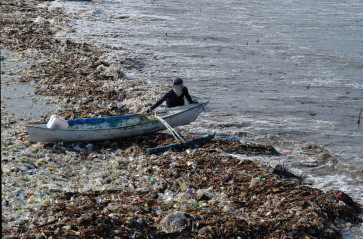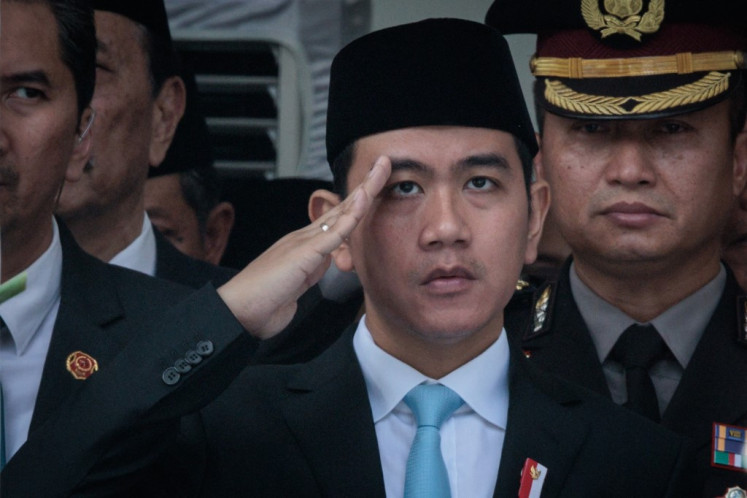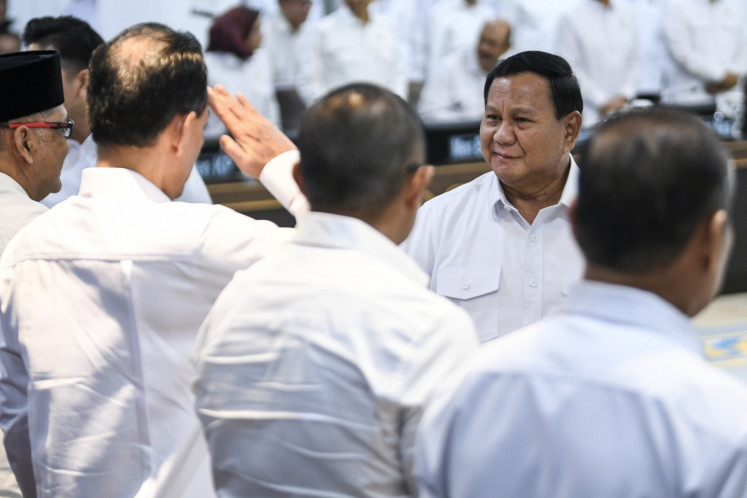Popular Reads
Top Results
Can't find what you're looking for?
View all search resultsPopular Reads
Top Results
Can't find what you're looking for?
View all search resultsAfter ‘Kura-Kura Berjanggut’, Azhari Aiyub delves deeper into the world of antiheroes
Courtesy of Banana PublisherProminent writer Azhari Aiyub turns a group of armed bandits into heroes in his next novel
Change text size
Gift Premium Articles
to Anyone
Courtesy of Banana Publisher
Prominent writer Azhari Aiyub turns a group of armed bandits into heroes in his next novel.
For Acehnese author Azhari Aiyub, heroes are not just those whose names appear in school textbooks. He believes there were individuals who fought for Indonesia’s independence but never received recognition.
Their contributions were overlooked because of their lack of hero attributes.
“For example, there were criminals who were also revolutionaries. Becoming a hero is not always black and white. There might be ridiculousness, foolishness or disgrace along the way. For me, these bad sides are interesting to look at,” he said.
Azhari prominently presented this antihero storyline in Kura-Kura Berjanggut (The Bearded Turtle), which stole the limelight after being named the best work of prose at the prestigious 18th Kusala Sastra Khatulistiwa Literary Awards last year. It follows the adventure of pirates trying to overthrow a greedy sultan in Aceh.
More antiheroes will appear in a novel that Azhari is working on. The main characters are armed bandits, who seek to kill and seize the wealth of a royal family that is allegedly backed by the Dutch. The bandits, who live around tobacco plantations, devise the plan upon hearing that the Dutch will reclaim the area.
The story is inspired by a real event in North Sumatra in 1947, when the Dutch reoccupied and renamed the region the State of East Sumatra. It was later reunified with Indonesia following the Round Table Agreement in The Hague in 1949.
Azhari Aiyub (Photo by A. Kurniawan Ulung)“[What happened during the movement] was like the storyline of the movie Nagabonar,” he said of the 1987 drama-comedy centering on a pickpocket-turned-soldier.
The antihero story perfectly fits Azhari, who has no interest in instilling moral values in his readers.
“Heroic stories that boast moral values suit children. However, my targeted readers are adults and I believe adults don’t need to be preached to because they know what’s good or bad,” he said.
Azhari’s approach in his stories is deeply influenced by the works of legendary author Pramoedya Ananta Toer. He said Pramoedya’s stories had helped him understand that life was not as simple as black and white.
The author attributes his writing career to his lifelong passion for reading.
Born 38 years ago in Banda Aceh, he grew up in a humble family with a father who made a living as a carpenter. When he was about 8 years old, Azhari saw that piles of children’s books had been taken out of the library of an elementary school near his house.
He jumped for joy when the school allowed him to have the books. He loaded the books onto his father’s wooden trolley and pushed them home to be stored in the attic.
During a long Ramadhan holiday, little Azhari read the books to kill time. It turns out that as he read more books, his love for reading only grew.
“Reading was fun. It made me realize a bigger world. Since then, I haven’t been able to stop reading,” said Azhari, who loves to write in the morning after sipping a cup of coffee.
Courtesy of MojokFor Azhari, literature work is a medium to express his anxieties and views. A collection of his short stories, Perempuan Pala (Nutmeg Woman), for example, tell about human rights violations and other impacts of the Indonesian Military’s (TNI) Operasi Jaring Merah (Red Net Operation) against the Free Aceh Movement (GAM) in the 1990s.
Meanwhile, Kura-Kura Berjanggut was inspired by the political condition of Aceh, especially after GAM leaders and the central government signed a peace agreement in 2005. The 960-page novel, which took a decade to complete, marked Azhari’s comeback to the Indonesian literary scene after a tsunami hit Aceh in 2004.
The tsunami, which claimed the lives of his parents and younger sister, dragged Azhari to the lowest point of his life. He found it hard to write and decided not to finish his undergraduate studies in language and literature at Syiah Kuala University in Banda Aceh.
“After the tsunami, going to the university was no longer interesting for me,” he said, adding that when the tsunami struck Aceh, he was with his friends in Pekanbaru, Riau.
Today, Azhari goes beyond than just writing his own fiction. He serves as a guest editor for Serambi Indonesia, curating short stories and poems for the Aceh newspaper’s feature page.
Through his essays and opinion pieces, he expresses his objections to Aceh’s sharia, which he believes only makes Aceh more conservative but has no impact on people’s welfare. The easternmost province remains one of the poorest in Indonesia.
He also deplored repressive and inhumane actions committed by the provincial police and the sharia police against vulnerable groups. Last year, the authorities arrested transgender women and forced them to act masculine.
“This country is a law-based country, and the persecution of those transgender people was clearly against the law,” he said.












